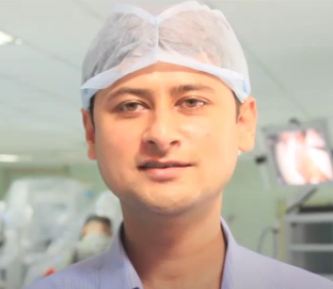Best Bariatric Surgeons in Indore
Bariatric surgeons :
Bariatric surgeons treat obesity by performing surgeries for weight loss. Bariatric surgeons use various types of surgical technique to assist in the weight loss journey of obese individuals who present with diminished cardiovascular and overall health. Bariatric surgeons mainly perform a procedure called Gastric bypass where a portion of stomach is cut off from the rest of the organ and is directly connected to the small intestine. This reduces hunger pangs and also effectively reduces the capacity of calorie absorption back into the body. Bariatric surgeons also perform sleeve gastrectomy in people which severe obesity where only a small tube of stomach is left attached to the digestive system. Bariatric surgeons provide a thorough assessment prior to proceeding with such invasive surgeries by diet counselling often in collaboration with dietitians. They do a post surgical follow up to ensure that the patient has an easy transition to new diet that must be followed after procedure.
66 Bariatric Surgeons found
View Profile
Ujjain State Highway
Near MR 10 Crossing
Sanwer Link Road Indore, Indore
Get directions

OP Timings
Fee : 2000
21-23 G F, Scheme No. 54,
Opp. Meghdoot Garden
Vijay Nagar, Indore
Get directions

OP Timings
Mon - Sat | 04:30 pm - 07:00 pm |
Fee : 500
101, Dilpasand Square, 164
Geeta Bhawan Circle, Kanchan Bagh
South Tukoganj, Indore
Get directions

OP Timings
Mon - Sat | 11:00 am - 01:00 pm, 05:00 pm - 08:00 pm |
Fee : 600
11, 2, Near Palasia
Near Cs Naidu Aracade
New Palasia, Indore
Get directions

OP Timings
Fee : 700
14, Anoop Nagar
LIG Square
AB Road, Indore
Get directions

OP Timings
Fee : 1200
2-3, Scheme No 44
Bhawar Kuan Road
AB Road, Indore
Get directions

OP Timings
Mon - Sat | 10:00 am - 02:00 pm |
Fee : 1000
CHL Hospitals
AB Road
near L.I.G Square
Rss Nagar
AB Road, Indore
Get directions

OP Timings
Mon - Sat | 09:00 am - 11:00 am |
Fee : 1000
Medanta Hospital
Vijay Nagar
Plot No. 8, PU04
Commercial Scheme 54
Vijay Nagar, Indore
Get directions

OP Timings
Fee : 1000
Dr. Dilip Kothari
MBBS, MS, FACRSI
Fellowship in Gastro Intestinal Surgery
Surgical Gastroenterologist
View Profile
Bombay Hospital
Vijay Nagar
IDA Scheme No.94/95
Eastern Ring Rd, Tulsi Nagar
Vijay Nagar, Indore
Get directions

OP Timings
Mon - Sat | 11:00 am - 03:00 pm |
Fee : 800
14, Manik Bagh Road
Near Choithram School
Manikbagh, Indore
Get directions

OP Timings
Fee : 700
AH/31 , Senior HIG
Pandit Deendayal Upadhyay Nagar
Sukhliya, Indore
Get directions

OP Timings
Mon - Sat | 10:00 am - 07:00 pm |
Fee : 700
CHL Hospitals
AB Road
near L.I.G Square
Rss Nagar
AB Road, Indore
Get directions

OP Timings
Mon - Sat | 10:00 am - 02:00 pm, 05:30 pm - 07:30 pm |
Fee : 800
Sri Aurobindo Institute of Medical Sciences
Sanwer Link Road Indore
Ujjain State Highway
Near MR 10 Crossing
Sanwer Link Road Indore, Indore
Get directions

OP Timings
Mon - Sat | 10:00 am - 01:00 pm, 02:00 pm - 04:00 pm |
Fee : 1000
Medicare Hospital & Research Centre
Old Palasia
4/5
Ravindra Nagar
Old Palasia, Indore
Get directions

OP Timings
Fee : 700
No 1, BCM Estate
Sri Badalchand Mehta Marg
Nipania, Indore
Get directions

OP Timings
Mon - Sat | 11:00 am - 05:00 pm |
Fee : 1500
View Profile
906/1, Indore-Icchapur Rd
Tower Chouraha, Khatiwala Tank
Sapna Sangeeta, Indore
Get directions

OP Timings
Mon - Sat | 02:00 pm - 03:00 pm, 06:00 pm - 08:00 pm |
Fee : 700
5/1, Bhawarkua Main Rd
Transport Nagar
Navlakha, Indore
Get directions

OP Timings
Fee : 500
Anand Hospital and Research Center
Sapna Sangeeta
7, Sindhi Colony
Bhawarkua Main Rd, Sindhu Nagar
Sapna Sangeeta, Indore
Get directions

OP Timings
Mon - Sat | 10:00 am - Onwards |
Fee : 1000
A.N.S Hospital
Rau
12F, 13F, Shramik Colony
A B Road, Kanupriya Nagar
Rau, Indore
Get directions

OP Timings
Fee : 500
318, Ranjeet Hanuman Road
Annapurana Road, Usha Nagar Ext
Usha Nagar, Indore
Get directions

OP Timings
Fee : 500
Door No 25-A
Bhawanipur Colony
Sudama Nagar, Indore
Get directions

OP Timings
Mon - Sat | 07:00 pm - 09:00 pm |
Fee : 500
Types of bariatric surgeries
Bariatric surgery encompasses various procedures aimed at promoting weight loss and addressing obesity-related health issues. Common types include:
- Gastric Bypass: Involves creating a smaller stomach pouch and rerouting the small intestine to limit food intake and nutrient absorption.
- Sleeve Gastrectomy: Removes a portion of the stomach, reducing its size and restricting food intake.
- Gastric Banding: Involves placing an adjustable band around the stomach to limit food consumption.
- Biliopancreatic Diversion with Duodenal Switch (BPD/DS): Restructures the stomach and small intestine to reduce both food absorption and calorie intake.
- Intragastric Balloon: Places a temporary balloon in the stomach to induce a feeling of fullness, aiding weight loss.
These procedures are chosen based on individual health factors, and the decision is made in consultation with a bariatric surgeon.
What happens during a consultation with a Bariatric Surgeon?
During a consultation with a Bariatric Surgeon, the focus is on evaluating a patient's eligibility for weight loss surgery and tailoring a personalized treatment plan.
- The surgeon conducts a thorough medical history review, assessing factors such as obesity-related health issues, previous weight loss attempts, and lifestyle.
- Physical examinations and diagnostic tests may be ordered to determine the most suitable procedure.
- The surgeon discusses potential risks, benefits, and expected outcomes, addressing any questions or concerns the patient may have.
- Nutritional counselling and postoperative care instructions are often provided to ensure a successful recovery.
The consultation is intended to provide the patient with the information they need to make informed decisions about their weight loss journey, encouraging a collaborative approach between the patient and the bariatric surgeon.
What kind of treatments do Bariatric surgeons provide?
Common treatments include:
- Gastric Bypass: A procedure that reduces the stomach size and reroutes the small intestine to limit food intake and nutrient absorption.
- Sleeve Gastrectomy: Involves removing a portion of the stomach to create a smaller, banana-shaped stomach, restricting food intake.
- Gastric Banding: Placing an adjustable band around the stomach to create a smaller pouch and control food consumption.
- Biliopancreatic Diversion with Duodenal Switch (BPD/DS): Restructures the stomach and small intestine to limit calorie absorption.
Bariatric surgeons also provide pre-and postoperative care, including counseling on lifestyle changes and nutritional adjustments to support successful outcomes.
Frequently asked questions
What is Bariatric Surgery?

Bariatric surgery is a medical procedure designed to aid weight loss and treat obesity-related health conditions. This surgery involves altering the stomach and/or digestive system to restrict food intake, induce feelings of fullness, or limit nutrient absorption. Common types include gastric bypass, sleeve gastrectomy, gastric banding, and biliopancreatic diversion.
Bariatric surgery is recommended for individuals with severe obesity or obesity-related health issues when conventional methods have been unsuccessful. It offers a long-term solution to promote significant weight loss, improve overall health, and reduce the risk of obesity-related complications.
How does one become a Bariatric Surgeon?

To become a Bariatric Surgeon, one typically needs to complete a medical degree (MBBS) and an internship. Following this, they pursue further education with a Master of Surgery (MS) or Diplomate of National Board (DNB) in General Surgery. Specializing in Bariatric Surgery is achieved through fellowships or additional training, and obtaining relevant certifications is essential. Bariatric Surgeons must stay updated with advancements in the field through continuous medical education.
What would be the consultation fees of a Bariatric Surgeon in Indore?

The consultation fees may vary depending on the surgeon's expertise, experience, and the clinic or hospital they are associated with. On average, consultation fees may range from INR 500 to INR 2000 or more. It is advisable to check with the specific clinic or hospital where the consultation is sought for accurate and up-to-date information on fees.
What is the average cost of bariatric surgery in Indore?

The average cost of bariatric surgery in Indore can vary based on the type of procedure, the surgeon's experience, and the hospital's facilities. Generally, the cost ranges from INR 2,00,000 to INR 5,00,000 or more. This estimate includes expenses related to surgery, hospital stays, pre-operative evaluations, post-operative care, and follow-up consultations. Patients are advised to consult with their chosen bariatric surgeon or healthcare facility for a detailed breakdown of costs and any additional expenses that may be incurred during the entire treatment process.
How do you prepare for a Bariatric Surgeon consultation?

To prepare for a consultation with a Bariatric Surgeon, follow these steps:
- Provide details about your medical history, previous surgeries, and any existing health conditions
- Note down your previous attempts at weight loss, including diets, exercises, and any medications used
- Compile a list of current medications and supplements
- Develop a list of questions regarding the specific bariatric procedure, potential risks, expected outcomes, and postoperative care
- Familiarize yourself with different bariatric surgery options
- If you have relevant medical reports or tests, bring them for the surgeon's review
What are the common conditions seen by a Bariatric Surgeon?

Bariatric Surgeons primarily address obesity-related conditions and perform weight loss surgeries. Common conditions they treat include:
- Obesity: Surgical intervention for severe obesity
- Type 2 Diabetes: Bariatric surgery can improve diabetes control
- Hypertension: Weight loss contributes to better blood pressure management
- Sleep Apnea: Surgery aids in alleviating sleep apnea symptoms
- Joint Pain: Reduced weight helps alleviate joint issues
- High Cholesterol: Weight loss surgery contributes to improved lipid profiles
What are the benefits of bariatric surgery?

Bariatric surgery is a transformative intervention offering both physical and psychological benefits for individuals struggling with obesity. The surgery offers several benefits, including:
- Significant and sustained weight loss
- Resolution or improvement of obesity-related conditions like diabetes, hypertension, and sleep apnea
- Increased mobility, improved mental health, and enhanced overall well-being
- Many experience long-term weight maintenance
- Lowered risk of mortality associated with obesity-related diseases
- Positive effects on metabolism and hormonal regulation
- Extended lifespan for those with severe obesity
Where can I find the best Bariatric Surgeon in Indore?

For the best Bariatric Surgeon near you, trust Skedoc. Skedoc connects you with highly skilled and experienced Bariatric Surgeons who specialize in weight loss surgeries. The platform ensures a seamless and user-friendly experience, allowing you to schedule appointments, access patient reviews, and make informed choices about your healthcare. With Skedoc, you can discover top-notch medical expertise, ensuring personalized and effective solutions for your weight loss journey.
How successful is bariatric surgery for weight loss?

Bariatric surgery has proven to be highly successful for weight loss. Many individuals experience significant and sustained weight reduction. Success rates vary, but a substantial percentage of patients achieve substantial weight loss and maintain it long-term. Bariatric surgery also helps resolution or improvement of obesity-related conditions such as type 2 diabetes, hypertension, and sleep apnea. The success of bariatric surgery is closely tied to lifestyle changes, dietary modifications, and ongoing medical supervision post-surgery.
What are the risks of bariatric surgery?

While bariatric surgery is generally safe, it comes with inherent risks, including:
- Possibility of postoperative infections
- Risk of bleeding during or after surgery
- Formation of blood clots, which can be serious
- Adverse reactions to anaesthesia
- Potential for leaks from the surgical connections
- Risk of nutritional deficiencies due to reduced nutrient absorption
- Increased likelihood of developing gallstones
- Rapid emptying of stomach contents causes nausea and weakness
While these risks exist, bariatric surgery's benefits often outweigh them, especially when performed by the best bariatric surgeon in India.




















